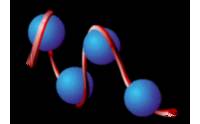
|
About the Polymer IRCThe Polymer IRC is formed from a core partnership of four Universities - Bradford, Durham, Leeds and Sheffield. With over one hundred full time academic research staff, the IRC has the strength in depth required to tackle the largest problems in polymer science. The scale of the IRC has given us the resources to develop purpose built facilities, and provide our staff with the tools necessary to carry out research to the highest standards. The Polymer IRC acts as an important focal point in UK polymer science and “soft nanotechnology”, organising meetings, workshops and collaborations that bring industry, government and academics together. The co-operation and interdisciplinary working skills needed to deliver solutions to scientific and technical problems have been honed within the IRC through ongoing integrated studies requiring participation of all member institutions. (See scientific programme). As a consequence of its organisation, the Polymer IRC can offer the scientific and engineering skills required for a wide range of projects, without being limited by geographic location. The Polymer IRC is an evolving organism that permits scientist and engineers to get together to solve some of the larger problems in the science. Our success in developing an effective model for managing interdisciplinary research in polymer science has resulted in our being used as a model for other interdisciplinary ventures funded by EPSRC, and led Europe, for example as the model for the Dutch Polymer Institute. Links with industry
The ability of the Polymer IRC to offer a comprehensive research package to industry has been enabled us to form an effective interface between commercial and academic sectors. Services include technology briefings, training courses and workshops, principally delivered through the IRC Industrial Club. Contract and consultancy work for industry is an important factor in the funding of many members' work. This work guides the design of our research projects, guidance that is assisted by feedback from our industrial club, and industrial members of our advisory board. Completing the circle, the IRC is responsible for training many of the scientists now working in the polymer industry. Movie top right: The recirculating flow cell depicted in this movie was developed at Bradford to permit very small batches of polymer to be evaluated under production conditions. This permits us to study the polymer samples produced typically by researchers. Being very small, however, the cell also allows us to study industrial polymers during processing. For examples: X-ray and synchrotron scattering techniques have allowed us to elucidate changes in polymer properties consequent upon changes in processing regime. The cell is an example of the good fit that exists between the IRC, academics and the polymer industry. Move your mouse over the film clip to (re)start the movie. |
|
|
|
|
© The Polymer IRC 2004, original design www.cookandkaye.co.uk / Webmaster
/ Disclaimer
/ Privacy The IRC includes the University of Bradford, the University of Durham, the University of Leeds and the University of Sheffield. | |
